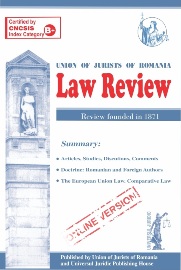Does lawrence v. Texas Provide Constitutional Support For Same-Sex Marriage?
Does lawrence v. Texas Provide Constitutional Support For Same-Sex Marriage?
Author(s): Andrei MărăşoiuSubject(s): Gender Studies, Law, Constitution, Jurisprudence, Civil Law, Human Rights and Humanitarian Law, Court case, Comparative Law
Published by: Universul Juridic
Keywords: same-sex marriage; Lawrence v. Texas; Constitutional Support;
Summary/Abstract: This essay explores the extent to which Lawrence v. Texas provides constitutional support for same-sex marriage. The Introduction gives an overview of the paper, presents the relevant details in Lawrence, and points to the two defenses in favor of decriminalizing homosexual conduct in Lawrence: a fundamental right to privacy and equal protection. In §1, I make the caveat that a legitimate state interest or rational basis could be invoked to uphold the constitutionality of a statute even when that statute may questionably be opposed to the fundamental right to privacy or to unqualified equal protection. When such a legitimate state interest cannot be provided, the fundamental right to privacy, as construed in constitutional law, protects US citizens from both state and federal interference in their private lives. §2 analyzes the fundamental right to privacy, and whether its invocation in Lawrence can be extended to defend same-sex marriage. I argue there are two construals of the fundamental right to privacy, a spatial construal, protecting citizens against unwarranted searches and use of evidence obtained unlawfully, and a decisional construal, according to which privacy is conceived of as individual autonomy with respect to those decisions that affect the core of an individual's life, including decisions regarding intimate, enduring relationships. In §3 I argue that, on its decisional construal, the fundamental right to pr ivacy conceptualized in Lawrence not only can, but should be invoked in favor of same-sex marriage. §4 answers an objection according to which the individual's fundamental right to privacy provides constitutional support for at most private relationships, not for marriage. §5 answers an objection according to which the right to privacy constitutionally supports only civil partnerships, and not marriage.
Journal: Law Review
- Issue Year: 2020
- Issue No: 02
- Page Range: 77-97
- Page Count: 21
- Language: English
- Content File-PDF

